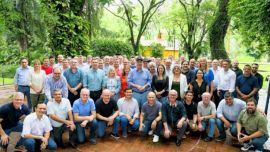Like Pope Francis, most Argentine politicians are, or pretend to be, convinced that prosperity is part of the natural order and poverty is therefore an aberration caused by wicked men. So instead of asking themselves what should be done to produce more goods and sell them at accessible prices, they concentrate on identifying the vile creatures they think deprive honest folk of what is rightfully theirs by overcharging them for what they buy. Many assume that rich businessmen and farmers, especially the heartless ones who are interested in making money, should top the hit lists they enjoy drawing up and pay hefty fines or go to jail. That great man Juan Domingo Perón threatened to hang the lot of them; he felt sure it would help bring prices down.
Those who think this way have got things backwards. Poverty is natural, prosperity is anything but. Until relatively recently, a bare two centuries ago, almost all members of our species were hard put to feed themselves, let alone get access to amenities even slum-dwellers in Western countries have come to take for granted. This unhappy situation changed when the industrial revolution, a capitalist phenomenon which kicked off in the United Kingdom, got into high gear and began spreading unprecedented wealth throughout the world.
Even so, variants of attitudes formed in earlier times, when to get rich you had to make the most of your ability to turn others into slaves or serfs and appropriate the fruits of their labours, refused to go away. They were strengthened by the feeling that there was something terribly unfair about changes linked to those “dark satanic mills” grinding away in their inhuman manner, with brutal money-grubbing businessmen mercilessly exploiting downtrodden workers, as they certainly did throughout the West in the not too distant past.
Such attitudes, which survive in much left-wing thinking, are undermining efforts to make economies like Argentina’s more productive. As far as many politicians are concerned, the country’s main problem is not that it produces too little but the fact that some lucky people have far more than most others. To solve it, they want to take money from the undeserving haves and distribute it among the have-nots.
This was one of the main themes in those laughably unimpressive debates, if that was what they were, which were staged by an enterprising television channel, so would-be legislators from Buenos Aires City and then the next-door Province of the same name could tell the public what they would do to put an end to the apparently permanent economic crisis. Most went on and on about who they think should be benefitted by their generosity while hardly mentioning where they would get the cash that would be needed. They evidently think the country has been blessed with vast forests of magic money trees and all they would have to do would be to sweep up whatever falls from them and share it with a suitably grateful populace.
This, more or less, was what Cristina Fernández de Kirchner had in mind when she was chatelaine of the Pink House and described soybeans as “weeds” that grow without anyone having to do much to cultivate them. For that reason, she said her government was fully entitled to deprive farmers of an ever larger part of what they expected to get by marketing them.
The leftists who wanted Argentina to tell all her creditors to go away so they could embark on a spending spree with the money thus saved were not the only participants who made it clear they lived in a dreamland in which, were it not for wicked capitalists, everything would be marvellously simple. Cristina and many of her supporters also imagine that, for sinister imperialistic reasons, the International Monetary Fund is determined to hold the country back by depriving it of the cash it needs; they keep hinting that unless Kristalina Georgieva and her technocrats play ball they will sever relations with it and do things their own way. However, there are signs that some Kirchnerites suspect that the “orthodox” economists they despise could be right when they warn them that breaking with the only people who are willing to lend them money on terms which are less onerous than what they would get from your neighbouring loan-shark would have truly disastrous consequences.
In much of the world, including Argentina, individuals regarded as intellectuals, as well as clergymen and left-leaning politicians, like banging on about the evils of capitalism, especially the liberal variety, as though there were plenty of other alternatives which, on the whole, are far better, to pick and choose from. Just what they would like to see happen is hard to say. Though the rulers of Venezuela, Cuba and North Korea do have their admirers, and there are survivalists who in their hearts would like the world to return to the days of when hunter-gatherers roamed free, capitalism, with its sharp edges blunted by measures designed to help those who otherwise would starve, is the only system that really works. Fighting it, as social justice warriors and politicians who seek to outbid them say is the duty of every decent person, is tantamount to waging war on prosperity.
If this were widely understood, Argentina’s prospects would be far less gloomy than they are. Much of what energy the political establishment has is devoted to making sure that in this part of the world capitalism, which elsewhere has made it possible for hundreds of millions of men and women to live better than any potentate of former times, cannot deliver the goods.
In a desperate bid to make itself more popular, the government formally headed by Alberto Fernández is doing its utmost to prevent the country from leaving mass poverty behind as so many others have done. Apparently unaware that, thanks largely to the hostility towards private enterprise of several generations of politicians, the economy is unable to produce very much, it is attacking the people who make things with the object of persuading the electorate that its many problems are entirely due to the country’s businessmen.
Leading the charge is an ill-tempered control-freak called Roberto Feletti. Like other life-long bureaucrats, he thinks he and his underlings are perfectly capable of replacing the market and deciding what things should cost, so his department has fixed maximum prices for no fewer than 1,432 products. As many have pointed out, for at least 4,000 years, regimes of one kind or another have repeatedly tried to do the same. Most failed dismally despite their eagerness to apply measures which were every bit as harsh as the one recommended by Perón, who wanted to string up those supposedly greedy shopkeepers he thought were making his government unpopular by driving up the cost of living.




















Comments